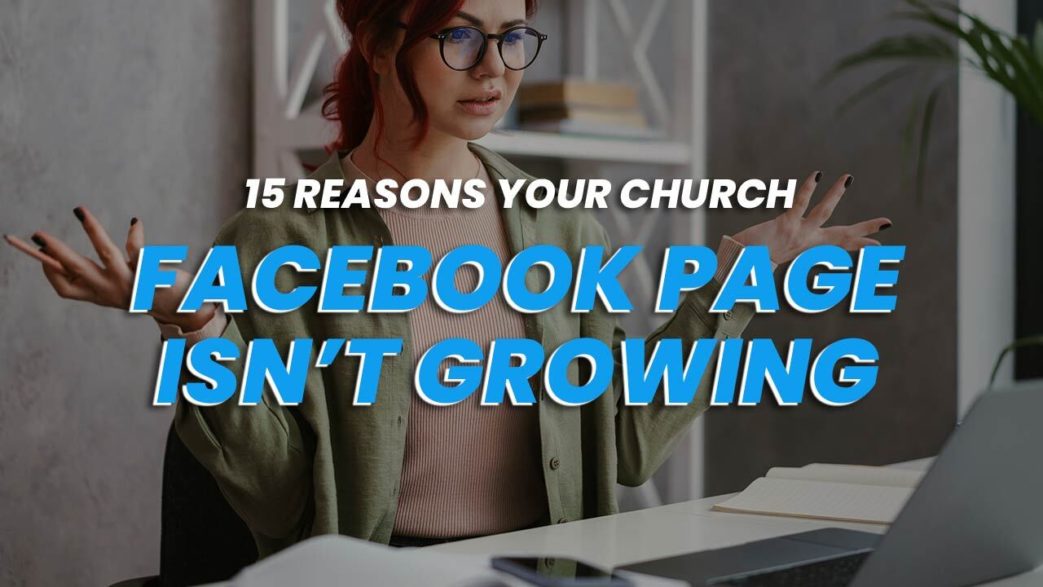While you’d love your church Facebook page to grow rapidly overnight, the truth is it does take time to grow a following. But, if you’re not seeing any real growth, there could be an underlying issue.
This doesn’t mean you need to give up on Facebook. All you have to do is figure out the core reason the page isn’t growing into the activity community you envisioned.
There’s no denying figuring out how to succeed on Facebook isn’t always easy. So, use these tips to adjust your strategy to start seeing better results.
Table of contents
- 1. Inconsistent Posting Schedule
- 2. Only Posting Invites To Your Church
- 3. Not Interacting With Comments
- 4. Only Posting One Type Of Content
- 5. Forgetting The Social Aspect
- 6. Only Sharing Your Own Content
- 7. Not Taking Advantage Of Facebook Insights
- 8. Posts Aren’t Engaging
- 9. Not Using Videos
- 10. Not Encouraging Engagement
- 11. Skipping Ads
- 12. Not Optimizing Your Facebook Page
- 13. No Social Media Plan
- 14. You’re Dealing With Trolls
- 15. Facebook Isn’t Where Your Members Are

1. Inconsistent Posting Schedule
This is one of the most common reasons that your church Facebook page might be a bit stagnant. The more that your followers interact with your page’s posts, the more often they’ll see your posts in their feed. Otherwise, they might only see a small percentage of your posts unless they visit your page directly.
If they’re visiting your church’s page, but see that you post sporadically, they don’t know when to check back. This leads to fewer interactions and less organic reach in news feeds. Creating a schedule helps you post more often. You don’t have to stay on Facebook 24/7, but consider posting once a day or even every other day. As long as you’re consistent, followers know when to check in.
As a side note, the way Facebook ranks content to determine what shows up in a user’s news feed is complicated. Search Engine Journal breaks it down fairly well. This can help you better understand why some posts get more attention than others. Hootsuite also details how the algorithm has changed, including the 2021 changes. If you’ve noticed a sudden change in growth on your page and you aren’t doing anything differently, this might help explain it.
2. Only Posting Invites To Your Church
Invitations are quick and easy. Plus, you’re probably wanting to use Facebook help gain new members. That’s wonderful. The only problem is invitations on their own aren’t engaging. When someone visits your Facebook page and sees nothing but a long list of invitations to services and special events, they don’t see your page as useful. Your members might use it to keep up to date on upcoming events, but that would be it.
You need interactive content that encourages conversations and sharing. You should definitely continue posting invitations, but ensure you’re posting content that’s more useful to users as well.
3. Not Interacting With Comments
One of the most common mistakes businesses and brands make with Facebook is not interacting with the comments. Facebook is a social network, which means you have to do more than just share posts. This is just step one. Step two is joining in on the conversation.
While you don’t have to respond to every single comment, especially on a highly active page, make sure you’re responding to questions at the very least. Or, if someone compliments your church or praises a great experience they had, post a thank you or a positive reaction.
With questions, this is your church’s chance to show that you value your followers. This could range from someone asking about service hours to a deeply personal issue that’s making them doubt their faith. You can even have private conversations on Facebook for more personal comments.
Ideally, you’ll want a few admins and moderators to help out with everything. The more responsive you are, the better impression you’ll make, leading to more overall page growth.
4. Only Posting One Type Of Content
When you’re strapped for time, posting just one type of content might seem more efficient. However, Facebook users like variety. This is why you see images, videos, text, links and so on. Perhaps you just share scripture daily over a beautiful scenic background. It’s a great type of post for churches, but mix things up a little.
Add in some images of your volunteers hard at work. Share links from your church’s blog. Post a question to encourage comments. Film a video snippet of you practicing your sermon to use as an invite. By posting a larger variety of posts, you’ll figure out what followers like best. You’ll also see more growth because you’ll be creating better posts that users want to share with others.
5. Forgetting The Social Aspect
We’ve already covered that you need to be social with your church Facebook page followers. However, there’s a second social element. You need to interact with other Facebook accounts. This might involve following fellow churches and Christian leaders. You might join groups to connect with other church staff or pastors to discuss issues and challenges you may be facing.
All of this socializing has two purposes. First, you get to make new friends. Second, you get an endless source of inspiration for new content to post. See what other churches are doing, talk about page growth strategies in groups, see what Christian leaders are currently discussing and more. All of this can lead to ideas for blog posts as well.
6. Only Sharing Your Own Content
This leads to a very common mistake that hurts your page’s growth – only sharing your own content. When you’re not socializing on Facebook (or at least following other Christian blogs outside Facebook), you might get tunnel vision when it comes to sharing on the platform.
If you run across a post and it moves you or you believe it could really help your followers, share it. You don’t always have to come up with posts from scratch. Naturally, you need to have a good mix of original and shared content, though.
Try to find a couple of useful things to share each week from other Facebook accounts, websites, blogs, etc. You could share videos, memes, images or anything else that’s relevant.
It’s a good idea to check the original source to make sure it’s not offensive. For instance, you probably wouldn’t want to share a meme from a Facebook page that’s all about trying to get people to stop attending church.
7. Not Taking Advantage Of Facebook Insights
As mentioned before, Facebook isn’t always the most straightforward platform. One post might go viral while a similar post only gets shared once. The big question is how do you know what’s resonating with your audience?
While the Facebook Analytics tool has been discontinued as of July 2021, businesses pages still have access to Facebook Insights. This gives you valuable details about your page’s performance. Quickly see what posts are getting the most engagement. Instead of just posting blindly and hoping for the best, see what your followers like best. What types of posts do they share most? Which posts lead to more followers?
Hootsuite also shows several different methods to track performance using Facebook tools and Hootsuite’s social media analytics tools.

8. Posts Aren’t Engaging
Brands on Facebook publish an average of 7.5 posts per day. Multiply that by millions of brands and you’ll quickly see how users could get overwhelmed by how much information is right at their fingertips on Facebook.
This means users are going to be pickier about what types of posts they interact with. The days of just a quick text post getting attention are gone. While you can still use text posts, they’ll likely get overlooked on crowded news feeds. These are ideal in groups or just as a quick update.
Instead, you need to focus on engagement. Posting a short video clip gives users something more to interact with. Instead of having to read something, they get a video, which makes the content more memorable. Images also work great and make text posts stand out more. In fact, images have the highest engagement rates at 0.18% (which is actually good) and videos are second at 0.13%.
Give users something worth looking at. Using the right Facebook images can make a major difference in engagement.
9. Not Using Videos
Facebook videos are viewed eight billion times a day. So, it’s easy to say video content is definitely popular. If your church Facebook page isn’t using video, you’re missing out on growth opportunities. Plus, if you utilize Facebook Live, your videos get as much as six times more engagement.
You don’t have to create long videos. Quick clips of 15 seconds are fun and easy to do. Or, make them longer. Of course, Facebook Live videos will be longer. These are great for interacting with your followers in real-time.
Consider uploading at least one video per week. You may even want to consider having a live video weekly to discuss last week’s sermon, address member questions or talk with Christian leaders. You could even interview members and volunteers as testimonials or as a “getting to know me” series.
10. Not Encouraging Engagement
The key to creating an active community on Facebook is encouraging engagement. Typically, there are two main ways to do this. First, create posts that ask for a response. Post a question to see how followers feel about a certain issue or scripture. Create polls or simply ask for feedback on how to improve your page. You can link to blog posts and ask users what they think.
The second is responding to comments. You can also encourage your members to get comments started and share your posts to get more people talking. More engagement equals more growth.
11. Skipping Ads
You might not want to spend money to boost your church Facebook page and you don’t have to. However, if growth isn’t happening for you, investing in ads could be the easiest solution, especially if you’re already doing everything else right.
Ads help increase visibility among your target audience. For instance, someone who has recently moved to the area might see your ad while someone 300 miles away wouldn’t. Of course, you have full control over what demographics you want to target in your ads. Plus, ads are surprisingly affordable on Facebook. Running small campaigns are all you need to see results.
Facebook ads have a variety of benefits for churches. We even have a guide to creating more successful Facebook ads to help you get started.
12. Not Optimizing Your Facebook Page
Just like with your church website, you need to optimize your church Facebook page. You don’t need to do anything complicated, but adding a few important details helps your church show up when people search for you. A few ways to quickly optimize your page include:
- Fill out your church’s profile completely
- Ensure all contact details are correct
- List your location
- Fill out the About section fully
- Upload a real photos of your church for your page header and profile image
- Post useful content on a regular basis (creates more opportunities for engagement)
- Post the content users like best (use Insights to discover what’s working)
13. No Social Media Plan
Whether it’s Facebook or another social media platform, it’s a good idea to have a plan in place. If you don’t have a clear strategy, it’ll be difficult to post regularly, keep track of what types of posts users like, socialize with followers and any other tasks.
A strategy helps you plan a schedule, what content to post, what your church’s goals are and who is responsible for maintaining everything. It’s a good idea to review your strategy from time to time to ensure it’s still working the way you want. Use our guide to help create your social media strategy.
14. You’re Dealing With Trolls
One of the reasons you need to stay active behind just posting new content is to moderate your page. If your comments are filled with negative, nasty or spammy posts, users might not feel comfortable interacting with your church online.
Sadly, trolls are unavoidable. However, Facebook lets you block users and delete comments. Having a few volunteers to moderate your page ensures it stays clean and safe for the followers who actually want to be part of your church’s online community.
15. Facebook Isn’t Where Your Members Are
As a final point to consider, talk with your members. Do they even use Facebook? If your members aren’t using Facebook, they’re not visiting your church Facebook page. This means they’re also not sharing anything. Members sharing your content is usually how church pages take off on Facebook.
If your members aren’t interested in Facebook, you may want to consider an alternative social media platform. Using ads can still help your Facebook page grow though.
A website and social media page are two of the best ways to create an active online presence for your church. If you already have social media, check out our church website design services to give people more ways to find you.




